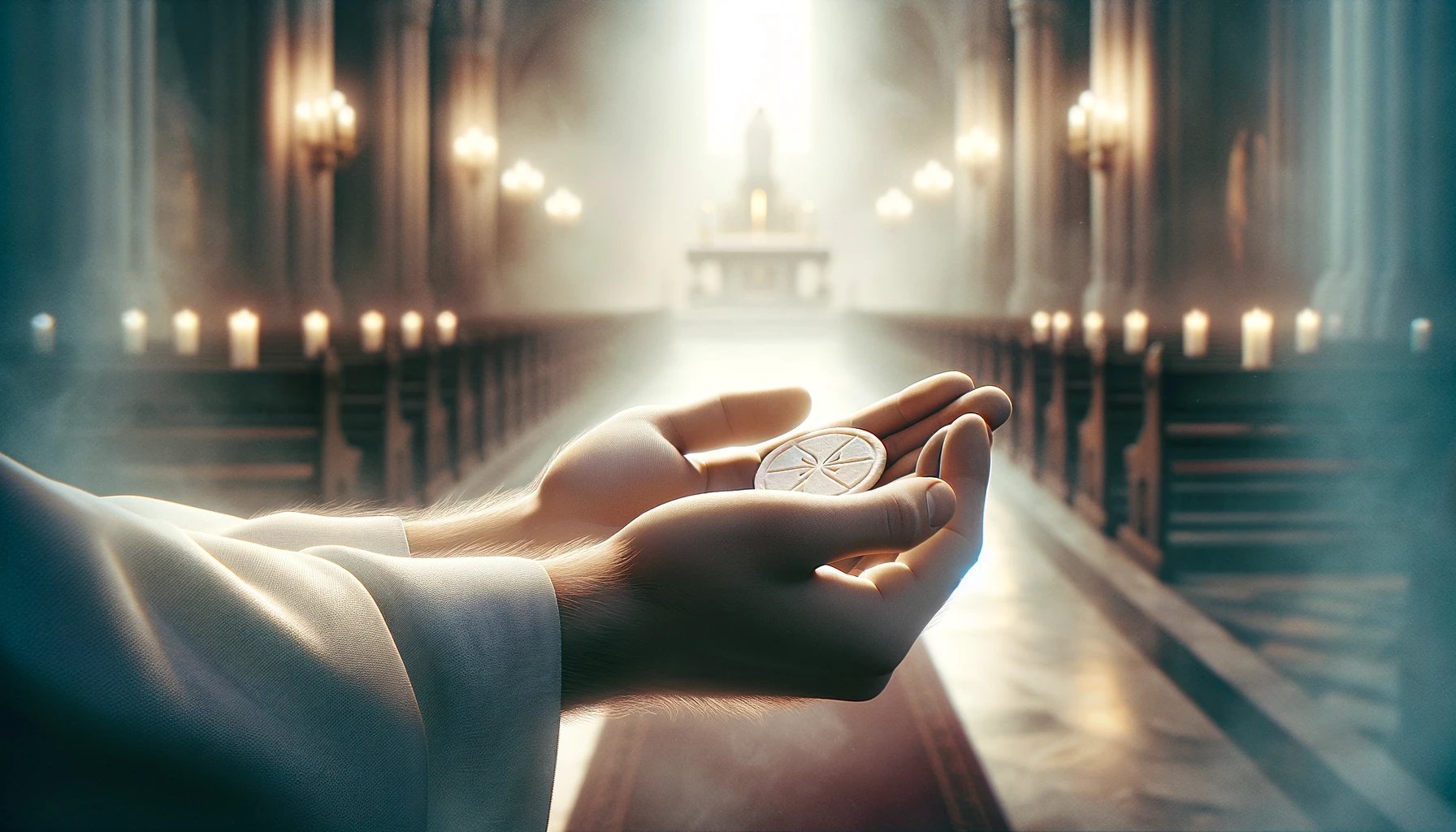Home>Theology and Spirituality>How Many Times A Day Can A Catholic Receive Holy Communion


Theology and Spirituality
How Many Times A Day Can A Catholic Receive Holy Communion
Published: February 25, 2024
Ericka Andersen, an editor at Christian.net, expertly merges digital strategy with content creation, focusing on faith and societal issues. Her communication skills enhance the platform's engaging narratives, fostering meaningful dialogue on belief's impact on society.
Learn about the frequency of receiving Holy Communion in the Catholic faith. Understand the theological and spiritual aspects of this practice. Explore the guidelines and significance.
(Many of the links in this article redirect to a specific reviewed product. Your purchase of these products through affiliate links helps to generate commission for Christian.net, at no extra cost. Learn more)
Table of Contents
Introduction
Receiving Holy Communion is a sacred and central practice in the Catholic faith, symbolizing the spiritual nourishment and unity with Christ and the Church. It is a profound and deeply meaningful ritual that holds great significance for Catholics around the world. The act of receiving the Eucharist, the body and blood of Christ, is a pivotal moment during the Mass, representing the core of Catholic belief in the real presence of Jesus in the consecrated bread and wine.
The Catholic Church places immense emphasis on the reverence and devotion associated with receiving Holy Communion. It is a moment of spiritual connection and renewal, inviting the faithful to partake in the divine grace and love of Christ. Understanding the teachings and guidelines regarding the frequency and circumstances of receiving Holy Communion is essential for Catholics to fully appreciate and participate in this sacred sacrament.
In the following sections, we will delve into the Catholic Church's teachings on receiving Holy Communion, explore the frequency of receiving the Eucharist, and examine the circumstances that govern the reception of this holy sacrament. By gaining a deeper understanding of these aspects, Catholics can enrich their spiritual journey and strengthen their bond with Christ and the Church.
The Catholic Church's Teaching on Receiving Holy Communion
The Catholic Church's teaching on receiving Holy Communion is rooted in centuries of tradition, theological understanding, and reverence for the Eucharist. Central to this teaching is the belief in the real presence of Jesus Christ in the consecrated bread and wine. According to Catholic doctrine, during the celebration of the Mass, the bread and wine are transformed into the body and blood of Christ through the process of transubstantiation. This profound mystery lies at the heart of the Church's understanding of the Eucharist and shapes its approach to the reception of Holy Communion.
The Church teaches that the Eucharist is not merely a symbolic representation of Christ's sacrifice, but a sacramental encounter with the living Christ. As such, the reception of Holy Communion is regarded as a deeply sacred and transformative act. Catholics are called to approach the Eucharist with reverence, faith, and a spirit of repentance, recognizing the profound spiritual significance of partaking in the body and blood of Christ.
Furthermore, the Church emphasizes the importance of being in a state of grace when receiving Holy Communion. This entails being free from mortal sin and having participated in the sacrament of reconciliation if one has committed serious transgressions. The Church's teaching underscores the need for spiritual preparation and purity of heart when approaching the Eucharist, reflecting the belief in the sanctifying power of this sacrament.
In addition, the Catholic Church upholds the practice of fasting before receiving Holy Communion. This discipline involves abstaining from food and drink (except water and medicine) for at least one hour before receiving the Eucharist. This period of fasting is seen as a way to cultivate a sense of spiritual hunger and anticipation for the sacred banquet, as well as a gesture of respect for the body and blood of Christ.
Overall, the Catholic Church's teaching on receiving Holy Communion underscores the sacred nature of the Eucharist, the real presence of Christ, the requirement of spiritual readiness, and the practice of fasting as integral aspects of participating in this central sacrament of the faith. By embracing these teachings, Catholics seek to deepen their communion with Christ and experience the transformative power of the Eucharist in their spiritual lives.
Frequency of Receiving Holy Communion
The frequency of receiving Holy Communion is a topic of profound significance within the Catholic faith, reflecting the spiritual nourishment and communion with Christ that the Eucharist offers to the faithful. The Catholic Church holds the reception of Holy Communion in the highest regard, encouraging the faithful to partake in this sacred sacrament regularly while emphasizing the spiritual preparation and disposition required for worthy reception.
In the Catholic tradition, the faithful are encouraged to receive Holy Communion frequently, ideally participating in the Eucharist during the celebration of the Mass. The Church views the reception of the Eucharist as a vital source of grace, strength, and spiritual sustenance, fostering a deeper union with Christ and the community of believers. Through the act of receiving the body and blood of Christ, Catholics reaffirm their faith and commitment to the teachings of the Church, experiencing a profound encounter with the living Christ.
The Church's Code of Canon Law specifies that the faithful are obliged to receive Holy Communion at least once a year, particularly during the Easter season. However, this minimal requirement does not diminish the encouragement for more frequent reception of the Eucharist. Many Catholics choose to receive Holy Communion more often, attending Mass and partaking in the Eucharist on a weekly basis or even more frequently, recognizing the spiritual benefits and transformative power of this sacred encounter with Christ.
The frequency of receiving Holy Communion is deeply intertwined with the individual's spiritual journey and relationship with God. For some, the reception of the Eucharist on a daily basis serves as a source of spiritual strength, guidance, and solace, nurturing a profound sense of closeness to Christ and the Church. This regular participation in the Eucharist allows individuals to immerse themselves in the grace and love of Christ, shaping their daily lives and actions in accordance with the teachings of the Gospel.
Ultimately, the frequency of receiving Holy Communion is a deeply personal and spiritual matter for Catholics, guided by their devotion, reverence, and understanding of the Eucharist. While the Church encourages regular participation in the sacrament, it also emphasizes the importance of spiritual readiness, repentance, and a disposition of faith and love when approaching the reception of the body and blood of Christ. By embracing the opportunity to receive Holy Communion frequently, Catholics seek to deepen their communion with Christ, nourish their souls, and embody the transformative message of the Gospel in their lives.
Circumstances for Receiving Holy Communion
The Catholic Church holds specific circumstances and guidelines governing the reception of Holy Communion, reflecting the reverence, spiritual preparation, and devotion associated with this sacred sacrament. Understanding these circumstances is essential for Catholics to approach the reception of the Eucharist with the appropriate disposition and reverence, ensuring a meaningful and transformative encounter with Christ.
One of the fundamental circumstances for receiving Holy Communion is being in a state of grace, free from mortal sin. The Church teaches that individuals should examine their conscience and seek the sacrament of reconciliation if they have committed serious transgressions, thereby reconciling with God and the community before approaching the Eucharist. This emphasis on spiritual purity and repentance underscores the sanctity of receiving the body and blood of Christ and the need for a contrite heart when partaking in this sacred sacrament.
Additionally, the Church emphasizes the importance of fasting before receiving Holy Communion. The faithful are required to abstain from food and drink (except water and medicine) for at least one hour before receiving the Eucharist. This period of fasting serves as a spiritual discipline, fostering a sense of anticipation and reverence for the sacred banquet and demonstrating respect for the real presence of Christ in the Eucharist.
Furthermore, the Church encourages Catholics to approach the reception of Holy Communion with a spirit of reverence, faith, and devotion. This entails preparing oneself spiritually before participating in the Eucharist, cultivating a disposition of humility, gratitude, and openness to the transformative grace of Christ. By approaching the reception of the Eucharist with reverence and faith, Catholics seek to deepen their communion with Christ and the community of believers, recognizing the profound significance of this sacramental encounter.
Moreover, the Church invites Catholics to participate in the celebration of the Mass as the central context for receiving Holy Communion. The communal aspect of the Eucharist underscores the unity of the faithful in partaking in the body and blood of Christ, emphasizing the communal dimension of the Church's worship and spiritual nourishment. By participating in the Mass, Catholics engage in the sacred ritual of the Eucharist within the context of the faith community, reinforcing their bond with Christ and the Church.
In summary, the circumstances for receiving Holy Communion encompass being in a state of grace, observing the practice of fasting, approaching the reception of the Eucharist with reverence and faith, and participating in the communal celebration of the Mass. These circumstances reflect the Church's emphasis on spiritual readiness, humility, and communal worship, guiding Catholics in approaching the reception of the Eucharist with reverence and devotion, thereby fostering a deeper communion with Christ and the community of believers.
Conclusion
In conclusion, the reception of Holy Communion holds profound significance within the Catholic faith, embodying the spiritual nourishment, unity with Christ, and communal worship that define the Eucharistic celebration. The teachings of the Catholic Church regarding the reception of the Eucharist emphasize the real presence of Christ, the requirement of spiritual readiness, and the practice of fasting as integral aspects of participating in this central sacrament of the faith.
The frequency of receiving Holy Communion reflects the individual's spiritual journey and relationship with God, with the Church encouraging regular participation in the sacrament while emphasizing the importance of spiritual readiness, repentance, and a disposition of faith and love when approaching the reception of the body and blood of Christ. The circumstances for receiving Holy Communion, including being in a state of grace, observing the practice of fasting, approaching the reception with reverence and faith, and participating in the communal celebration of the Mass, guide Catholics in approaching the reception of the Eucharist with reverence and devotion, fostering a deeper communion with Christ and the community of believers.
Ultimately, the reception of Holy Communion is a sacred and transformative act, inviting the faithful to partake in the divine grace and love of Christ. By embracing the teachings and guidelines surrounding the reception of the Eucharist, Catholics can enrich their spiritual journey, strengthen their bond with Christ and the Church, and embody the transformative message of the Gospel in their lives. The Eucharist stands as a profound symbol of unity, grace, and spiritual nourishment, inviting Catholics to deepen their communion with Christ and the community of believers, fostering a profound sense of closeness to Christ and the Church.
In essence, the reception of Holy Communion is a sacred sacrament that transcends the physical act of consuming bread and wine, representing a spiritual encounter with the living Christ and a communal expression of faith, unity, and love. It is a moment of profound significance, inviting Catholics to partake in the divine grace and love of Christ, fostering a deeper communion with Christ and the community of believers, and embodying the transformative message of the Gospel in their lives.















